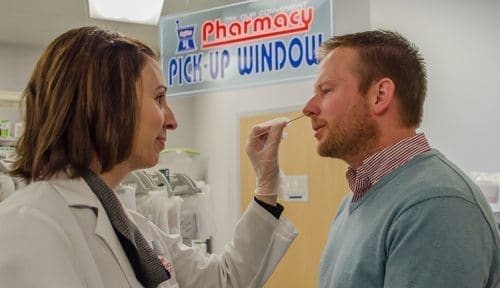
Donald G. Klepser, PhD, seen here getting a nose swab needed for rapid flu tests, coauthored a study published in the Research in Social and Administrative Pharmacy journal this week on point-of-care testing. Photo: University of Nebraska Medical Center
A new study shows that a collaborative physician-community pharmacy program to treat flu and strep throat has the potential to improve patient care and population health. The study, published this week in the Research in Social and Administrative Pharmacy journal, was funded by the NACDS Foundation. Two of the authors of the study, Donald Klepser, PhD and Michael Klepser, PharmD, were developers of the NACDS’ Point-of-Care Testing Certificate Program.
Pharmacy-based point-of-care testing is done as part of care coordination under the prescribing authority of a licensed provider. The current study validates a model of increased access for patients to receive appropriate care—with a collaborative practice agreement—for flu and strep throat in the community pharmacy setting. Specifically, the study shows that the model can be replicated in the community beyond the parameters of a research study.
Michael Klepser recently accepted an award at the American Pharmacists Association (APhA) Annual Meeting for a clinical research paper he co-authored in the Journal of the American Pharmacists Association, which also reported on the effectiveness of a collaborative physician-community pharmacy program to treat flu-like illness.
In an interview, Klepser said, “We see this as beneficial to patients…and to healthcare in general in improving access to care for patients.”
The study reaffirmed that point-of-care testing increases access to care for patients, especially those seeking care outside of normal clinic hours and for patients without a primary care physician.